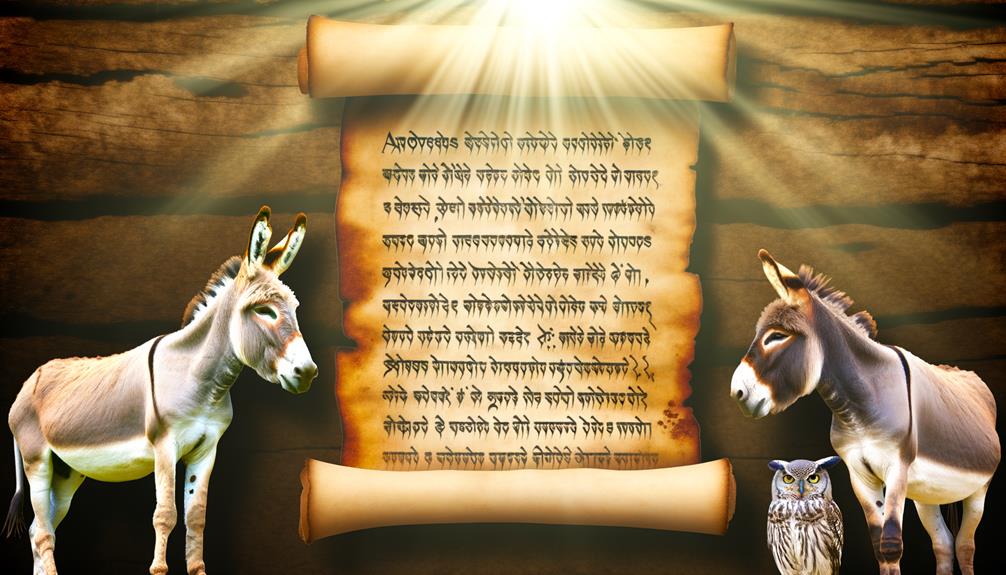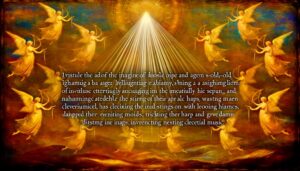Bray Meaning In The Bible: Sound and Significance
In the Bible, ‘bray’ principally refers to the harsh cry of a donkey, derived from Old French and Latin roots. It appears in several key scriptures such as Job 6:5 and Proverbs 27:22, often symbolizing distress, futility, and human folly.
For instance, in Proverbs, it underscores the persistence of foolishness despite efforts to correct it. The metaphor extends to convey deeper emotional and existential themes, illustrating natural expressions of unmet needs and desolation.
Exploring these contexts enriches one’s understanding of the nuanced human conditions and divine teachings reflected in the biblical narrative.

Bray Meaning in the Bible: Symbolism and Biblical Context
| Aspect | Explanation |
|---|---|
| Definition | Bray refers to a loud, harsh cry, often associated with a donkey. |
| Biblical Usage | Used to symbolize foolishness or arrogance, especially in Proverbs. |
| Key Verse | Proverbs 27:22 – “Though you grind a fool in a mortar… his folly will not depart from him.” (Often linked metaphorically with braying) |
| Symbolic Meaning | Represents stubbornness, pride, or unwise speech. |
| Moral Lesson | Highlights the futility of trying to reform a hardened fool. |
Definition and Etymology

The term ‘bray‘ in the Bible, while relatively infrequent, has a specific definition and etymological background that merit detailed examination.
In its simplest form, ‘bray’ refers to the harsh cry of a donkey. Etymologically, the word derives from the Old French ‘braire’, which itself originates from the Latin ‘barrire’, meaning to cry out.
In biblical Hebrew, the term is often translated from the word ‘נָהַק’ (nahaq), which similarly connotes the loud, resonant call of a donkey.
This nuanced understanding of ‘bray’ provides a richer comprehension of its limited but vivid textual appearances. Knowing its precise definition and origins allows for a more accurate interpretation of biblical passages where the term is used.
Occurrence in Scripture

The term ‘bray‘ appears in several significant biblical passages, each providing unique contextual interpretations and symbolic meanings.
By examining these references, we can gain insights into how the term was perceived in ancient texts.
This analysis will explore the specific verses where ‘bray’ is mentioned, the context within those scriptures, and the broader implications of its symbolism.
Significant Biblical References
Various passages in the Bible mention the term ‘bray,’ each providing insight into its contextual significance within scripture.
One notable reference is in Job 6:5, where the rhetorical question, ‘Does a wild donkey bray when it has grass?’ emphasizes the natural expression of distress or need.
Similarly, Proverbs 27:22 states, ‘Though you grind a fool in a mortar, grinding them like grain with a pestle, you will not remove their folly from them.’ Here, ‘bray’ metaphorically highlights the stubbornness and immutability of folly despite rigorous attempts at correction.
These references collectively underscore the term’s connotation of vocal distress and futility, enriching the interpretative depth of biblical teachings.
Contextual Scriptural Interpretation
Contextual scriptural interpretation of the term ‘bray’ involves analyzing its occurrences in the Bible to understand the nuanced meanings and implications within different passages. This term appears in specific contexts that can shed light on its broader significance.
By examining these instances, one can gain insights into the cultural, historical, and theological dimensions of the text.
- Proverbs 27:22: Depicts the act of grinding fools in a mortar, yet their folly remains.
- Job 6:5: Uses ‘bray’ to describe the vocal expressions of animals, symbolizing complaint.
- Job 30:7: Refers to people in desolate places, braying among bushes.
- Isaiah 32:14: Alludes to deserted cities where wild donkeys bray.
- Ecclesiastes 12:4: Describes an environment where sound diminishes, contrasting with braying.
This analysis aids in comprehending the multifaceted use of ‘bray’ in scriptural texts.
Symbolism and Meaning
In examining the symbolism and meaning of ‘bray’ within scripture, it becomes evident that this term often conveys a sense of futility, complaint, and desolation.
Scriptural references, such as Job 6:5, illustrate this by depicting the braying of a donkey as an expression of unmet needs and dissatisfaction. This portrayal underscores the broader biblical theme of human lamentation and the struggle for divine provision.
Additionally, Proverbs 27:22 uses ‘bray’ metaphorically, likening the act of crushing a fool in a mortar to the futile effort of trying to remove folly from him.
Consequently, ‘bray’ encapsulates both literal and figurative dimensions, symbolizing the persistence of human folly and the often fruitless nature of certain endeavors in the biblical narrative.
Symbolism of Donkeys

Donkeys in the Bible often symbolize humility, service, and the burdens of life, providing a rich tapestry for theological and literary analysis. These creatures are frequently depicted as carrying heavy loads, reflecting their role in agricultural and transport needs in ancient societies. The symbolic value of donkeys extends beyond their physical attributes to encompass moral and spiritual lessons.
- Humility: Donkeys are modest creatures, often contrasted with horses, which symbolize power.
- Service: They are loyal and hardworking, embodying a spirit of servitude.
- Burden-Bearing: Their capacity to carry loads symbolizes human endurance and perseverance.
- Peace: Unlike warhorses, donkeys are associated with peace and reconciliation.
This rich symbolism enhances biblical narratives with layers of meaning.
Examples in Old Testament

The rich symbolism of donkeys as embodiments of humility, service, and burden-bearing is vividly illustrated in several key Old Scriptures narratives.
In Numbers 22, Balaam’s donkey serves as a divine instrument, perceiving the angel of the Lord and thereby preventing Balaam’s folly. This narrative underscores the donkey’s role in divine communication and intervention.
Similarly, in 1 Samuel 9, Saul’s search for his father’s lost donkeys leads him to the prophet Samuel, signifying the humble beginnings of Israel’s first king. The donkey’s presence in these passages accentuates themes of guidance and providence.
In Zechariah 9:9, the prophecy of a king arriving on a donkey symbolizes peace and humility, further cementing the animal’s profound biblical significance.
Lessons From Proverbs

The Book of Proverbs offers profound insights into the principles of wisdom and understanding, as well as the virtues of righteousness and justice.
Through its didactic verses, Proverbs emphasizes the importance of acquiring knowledge and discernment to lead a virtuous life.
Additionally, it underscores the necessity of upholding ethical standards and equitable treatment in all aspects of human interaction.
Wisdom and Understanding
Proverbs, a book renowned for its profound wisdom and practical guidance, offers invaluable insights into the nature of wisdom and the pursuit of understanding. This ancient text emphasizes the importance of seeking knowledge and discerning truth through a disciplined and reflective approach.
Key themes include:
- The fear of the Lord: The beginning of wisdom, as a reverent awe and deep respect for divine authority.
- Prudence: Making careful and sensible decisions that consider long-term consequences.
- Discretion: The ability to avoid unnecessary risks and maintain a level of caution in one’s actions.
- Discernment: The skill to distinguish right from wrong, and truth from falsehood.
Proverbs therefore serves as a timeless guide for cultivating wisdom.
Righteousness and Justice
Building upon the foundation of wisdom and understanding, Proverbs also underscores the essential principles of righteousness and justice as key components of a well-lived life.
These virtues are repeatedly highlighted as integral to maintaining social harmony and personal integrity. Proverbs 21:3 states, ‘To do what is right and just is more acceptable to the Lord than sacrifice,’ emphasizing that ethical conduct outweighs religious rituals.
Additionally, Proverbs 11:1 condemns dishonest scales, symbolizing the broader concept that fairness and equity are paramount.
The Book of Proverbs presents righteousness and justice not merely as moral ideals but as practical directives essential for societal stability and divine favor.
Such teachings advocate for a life guided by ethical principles that transcend personal gain.
New Testament Insights

Although the term ‘bray’ is infrequently encountered in the New Scriptures, its usage and implications can still be discerned through careful exegesis of related passages and themes.
The New Covenant presents various contexts where vocal expressions and their underlying intentions are significant. Significantly, these expressions often serve as metaphors for deeper moral and spiritual states.
- Loud cries of repentance: Emphasizes the earnestness of seeking divine forgiveness.
- Proclamations of faith: Highlights the importance of vocal affirmations in the Christian tradition.
- Expressions of anguish: Reflects the human condition and the need for divine intervention.
- Joyful praises: Symbolizes the celebration of salvation and divine grace.
Thus, these themes offer a nuanced understanding of vocal expressions akin to ‘bray’ within a theological framework.
Theological Interpretations

Theological interpretations of the term ‘bray’ provide a profound exploration into the symbolic and metaphorical dimensions of vocal expressions within biblical texts.
In scriptures, ‘bray’ often denotes a loud, harsh cry, typically associated with animals such as donkeys. Theologically, this vocalization can be viewed as a representation of human folly and obstinacy.
For instance, in Proverbs 27:22, the act of braying grain in a mortar symbolizes the persistent nature of foolishness despite corrective measures. Such interpretations suggest a deeper moral lesson, emphasizing the resistance of the unwise to transformation.
Accordingly, ‘bray’ serves as a metaphor for the stubbornness inherent in human nature, reinforcing the necessity of wisdom and understanding in spiritual growth.
Modern Relevance

Understanding the symbolic use of ‘bray’ in the Bible allows for an insightful examination of its modern relevance, particularly in how contemporary society interprets and applies ancient moral lessons.
The term ‘bray,’ associated with the harsh cry of a donkey, often symbolizes foolishness or lack of wisdom. Today, its metaphorical connotations can be observed in various contexts:
- Social Media: The cacophony of voices, often lacking substance.
- Political Discourse: Empty rhetoric and grandstanding.
- Consumer Culture: Superficiality and the pursuit of hollow trends.
- Education: The difference between acquiring information and true understanding.
Analyzing ‘bray’ in these modern settings encourages a deeper reflection on the enduring value of discernment and wisdom.
Conclusion
The biblical term ‘bray,’ primarily associated with the vocalization of donkeys, serves as a vivid metaphor for folly and obstinacy throughout Scripture.
Its occurrences, from the Old Covenant examples to Proverbs’ wisdom and New Covenant references, underscore a consistent theological narrative.
Juxtaposing the humble yet stubborn donkey against human behavior, the Bible invites reflection on spiritual and ethical conduct.
This imagery bridges ancient wisdom with contemporary relevance, urging a mindful examination of one’s actions and attitudes.






